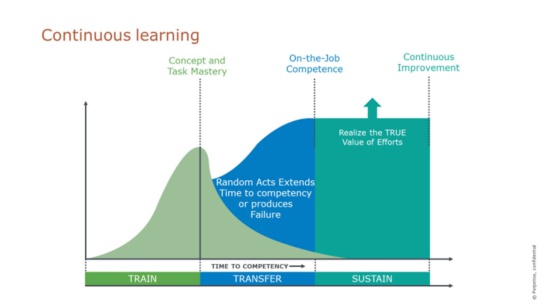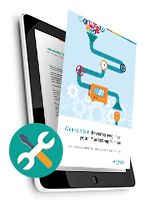When it comes to training, businesses generally prefer to leave it to HR. And the same goes for training evaluation. So there’s a good opportunity for HR to increase their impact on business operations. This typically takes place in the form of evaluations, when determining training requirements. And the other way around: evaluating if trainings are achieving their goals with employees performing better.
Pitfalls of conventional evaluation after training
Unfortunately, this latter form of evaluation is all too rare. Many HR professionals are happy to evaluate the training itself, usually by measuring participant satisfaction. Now the trainer and the content do – of course – still need to be evaluated by participants. But this isn’t the most important thing.
Real evaluation can only take place weeks and sometimes even months later. Have the salespeople permanently changed the way they work? Can they put newly-acquired competencies into practice? Are they actually performing better?
Get more from your training budget: measuring ROI
Not measuring the impact of training on the business puts training budgets under pressure. Businesses rightly need to question the usefulness of training. Especially when salespeople are taken out of the field and so have less time to actually make deals. But the benefit of training is sometimes limited to briefly boosting employee motivation, which then ebbs away again just as quickly. The impact of training isn’t just the responsibility of HR and the training course itself, however.
Turning training into a continuous learning process – integrated in the work environment – enables your people to learn skills and behaviour that they benefit from permanently. A number of techniques include:
- The 70-20-10 rule, where only 10% of time invested is for training, with 20% specifically linked to coaching that accompanies the training, and 70% for support in the workplace
- Allow direct managers to follow the training too. So they’re also familiar with all the content and can provide better coaching. Depending on the training content and corporate culture, they can either join the employee session or organise a separate one
- Snackable learning – not to be confused with e-learning. This involves short, interactive sessions (nuggets) that are made available to salespeople via their smartphone or tablet. They can help reinforce and embed the training content. And they always remain available as a refresher when specific situations arise. Think of it as an interactive ‘How do I …?’ YouTube clip
- Convert customer expectations and business objectives into specific behaviour and competencies that can form the basis personal development plans

A culture of continuous improvement
The above enables you to get a culture of continuous improvement on track, together with the business. Actively supporting direct managers in the 90% non-training time, means HR can help influence the impact. You can then implement any necessary changes depending on the progress made and any obstacles encountered. Research by CSO Insights shows that continuous learning can increase sales performance by 50%.
Customer expectations are changing fast as a result of digitisation. Customers today are better informed than ever before. So they don’t need salespeople to come and inform them about their company or products.
Download your checklist:
Top 10 essential attitudes and skills that today’s better-informed customer expects from sales



 Pascal Persyn
Pascal Persyn